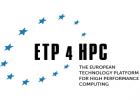You are here
8 Public-Private Partnerships signed in Brussels between EC and industry

Today, 17 December, the 8 Contractual partnerships with industry in research and innovation of Horizon2020 were signed in Brussels in the official ceremony at the presence of Neelie Kroes, Vice-President of the European Commission and digital agenda commissioner, and Herbert von Bose, Director of the Industrial Technologies directorate for the European Commission.

Among the 8 cPPP (contractual Public-Private Partnerships) under Horizon2020 signed today, also the ETP4HPC cPPP, represented for the signature by Philippe Vannier (for ETP Chair, Bull CEO) and Sanzio Bassini (Cineca) and by Neelie Kroes, and Herbert von Bose.
The Public-Private Partnerships take the form of contractual agreement (cPPPs) between the European Commission and representative industrial associations for key sectors of Europe's economy. In this way, the EU and industry will provide vital funding for research and innovation activities in sectors which are essential to Europe's industrial leadership.
The documents signed today set out commitments over a seven year period for both the EU and the industrial partners. The cPPP's implement industry-defined strategic research and innovation agendas through co-funded projects selected through Horizon 2020 calls for proposals. The cPPPs will therefore bring together companies, universities, research laboratories, innovative SMEs and other groups and organisations around major research and innovation challenges.
The Commission has committed under Horizon 2020 to partnerships with industry in the form of contractual Public-Private Partnerships (cPPP) in eight areas:
- Factories of the Future (FoF), to support the manufacturing industry through the development of sustainable production technologies and systems
- Energy-efficient Buildings (EeB), to increase the competitiveness and energy efficiency of the construction industry
- European Green Vehicles Initiative (EGVI), to develop a competitive and resource efficient transport system with significantly less CO2 emissions
- Sustainable Process Industry (SPIRE), to make the process industry more resource- and energy-efficient
- Advanced 5G network infrastructure for the Future Internet (5G), to stimulate the development of network internet infrastructure to ensure advanced ICT services for all sectors and users
- High Performance Computing (HPC), which plays a pivotal role in stimulating Europe’s economic growth and advancing European science
- Robotics, a key driver of industrial competitiveness and essential to address key societal challenges in areas such as demographic change, health and well-being, food production, transport and security
- Photonics, one of the key enabling technologies for our future prosperity and an essential element of many sectors, from energy efficient lighting and health, to optical data communication, laser based manufacturing and sensing for safety and security
For the whole seven year period of H2020, EU funding is expected to be in the order of € 6.2 billion, of which €700 million for High Performance Computing (€142 million in 2014-2015).
Industry has pledged to complement these amounts with private investment in the order of three to 10 times the level of public funding, with related activities included.
For the official EC press release look http://europa.eu/rapid/press-release_MEMO-13-1159_en.htm
For details on ETP4HPC look http://www.etp4hpc.eu
